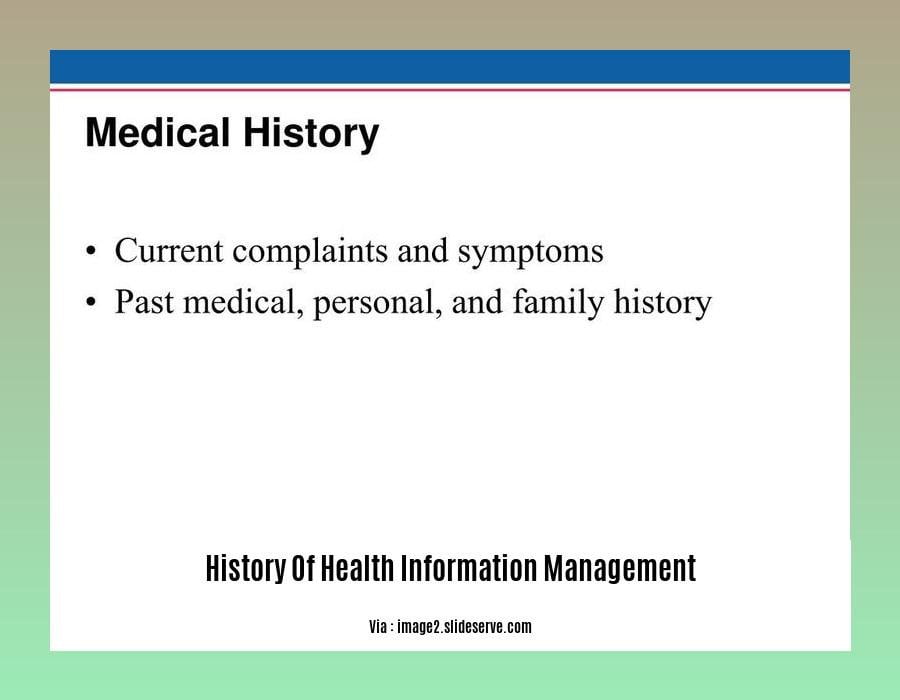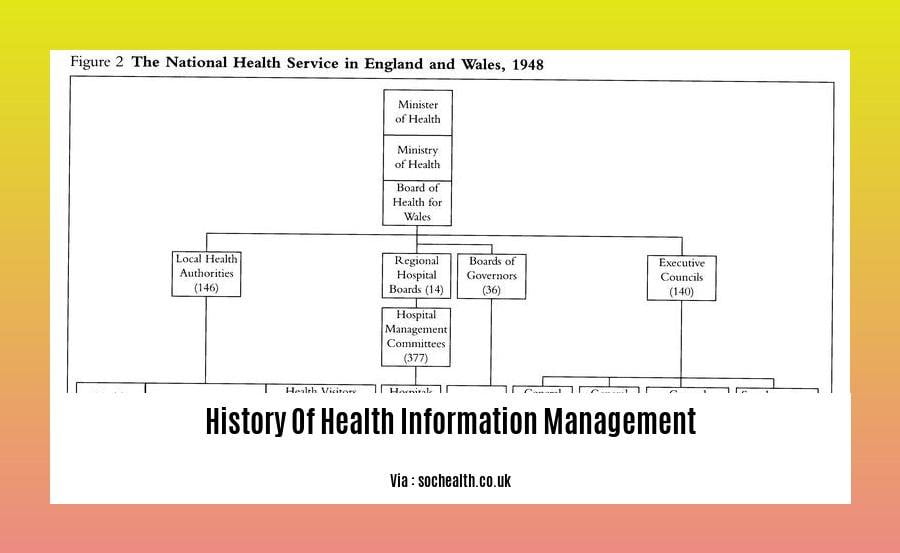Embark on a captivating journey through the annals of health information management in Nigeria. From the humble beginnings of paper-based records to the dawn of sophisticated health management information systems, this article unveils the transformative evolution of the field, offering a comprehensive historical account for practitioners and stakeholders alike.
Key Takeaways:
- Health information management (HIM) manages and shares health data and information securely.
- HIM has evolved from paper records to digital health technologies like electronic health records (EHRs).
- The master patient index (MPI) revolutionized health information exchange in the 1980s.
- HIM professionals play a vital role in efficient healthcare information use.
- Health informatics, which combines health sciences with information technology, is closely related to HIM.
History of Health Information Management


From Paper to Digital: A Trajectory of Transformation
The history of health information management is a testament to the relentless evolution of healthcare. From humble beginnings with paper records to the advent of electronic health records (EHRs) and beyond, this field has undergone a profound transformation.
Origins in Paper-Based Records
The roots of health information management can be traced back to the days of paper-based patient charts. These records contained vital information about patients’ medical history, diagnoses, treatments, and medications. However, managing and accessing these records was a daunting task, often leading to delays and errors.
The Dawn of Electronic Health Records
The introduction of EHRs in the 1980s revolutionized the way health information is managed. EHRs enabled the digital storage and retrieval of patient data, making it more accessible, secure, and efficient. The master patient index (MPI), introduced during this period, provided a centralized database for patient information, facilitating health information exchange (HIE).
The Rise of Health Informatics
In recent years, health informatics has emerged as a closely related field to HIM. Health informatics combines health sciences and information technology to develop and implement innovative solutions for managing and analyzing health information. This interdisciplinary approach has further enhanced the capabilities of HIM professionals.
The Future of HIM
The future of HIM is poised for continued growth and innovation. The adoption of artificial intelligence (AI) and machine learning (ML) is expected to streamline data analysis, improve health outcomes, and personalize patient care. As healthcare becomes increasingly data-driven, HIM professionals will play a pivotal role in shaping the future of healthcare delivery.
To understand the impact of health information management in the healthcare system, explore the evolution of health information management.
For a comprehensive overview of the industry’s past, visit our article on the history of HIM.
Additionally, uncover the development of record-keeping practices by reading our piece on the history of medical records management.
History of Health Management Information System in Nigeria
The history of health management information system in Nigeria can be traced back to the colonial era, when a rudimentary system was put in place to track vital statistics and disease outbreaks. In the years since independence, the NHMIS has undergone several revisions and modernizations to meet the evolving needs of the healthcare system.
Key Developments
- 1960s: Establishment of the National Health Management Information System (NHMIS) to collect, store, and manage healthcare data.
- 1980s: Introduction of electronic data processing (EDP) to improve data management and reporting.
- 1990s: Development of the first national health information policy to guide the use of health data.
- 2000s: Implementation of electronic health records (EHRs) in some hospitals and clinics.
- 2014: Revision of the NHMIS policy to address gaps and improve effectiveness.
Challenges and Opportunities
The NHMIS has faced a number of challenges over the years, including:
- Limited funding and resources
- Lack of skilled personnel
- Infrastructure issues (e.g., electricity, internet connectivity)
Despite these challenges, the NHMIS has made significant progress in improving data quality and availability. The system has also played a vital role in supporting evidence-based decision-making, disease surveillance, and health research.
The Role of Health Information Management Professionals
Health information management professionals play a critical role in ensuring the effective management of health data in Nigeria. Their responsibilities include:
- Collecting, analyzing, and interpreting health data
- Developing and implementing data management systems
- Maintaining the privacy and security of health information
- Providing education and training on health data management
Key Takeaways:
- The NHMIS plays a crucial role in collecting, storing, and managing healthcare data in Nigeria.
- The NHMIS has undergone several revisions and modernizations over the years to improve its effectiveness.
- The NHMIS faces a number of challenges, including limited funding and resources, lack of skilled personnel, and infrastructure issues.
- Health information management professionals play a vital role in ensuring the effective management of health data in Nigeria.
Citation:
- Oladepo, O., & Oladimeji, S. (2016). The Nigerian health information system policy review of 2014: the need for a strategic repositioning. Health Information Research, 22(1), 51-58.
FAQ
Q1: What is health information management, and how did it evolve in Nigeria?
Q2: How did the introduction of the master patient index and health information exchange impact health information management in Nigeria?
Q3: What role do health information management professionals play in the evolution of healthcare information systems in Nigeria?
Q4: How has the Electronic Health Recording (EHR) system influenced health information management practices in Nigeria?
Q5: What are some challenges and opportunities for health information management in Nigeria, and how can they be addressed?
- Unlock 6000+ words beginning with he: A comprehensive analysis - April 20, 2025
- Mastering -al Words: A Complete Guide - April 20, 2025
- Master Scrabble: High-Scoring BAR Words Now - April 20, 2025
















